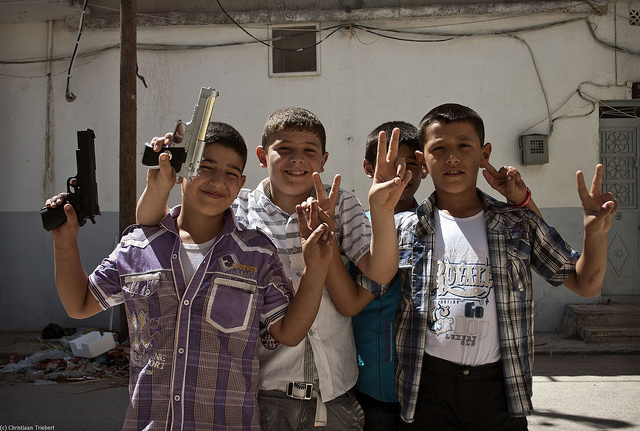Rebel-held Aleppo was the first casualty of President-elect Donald Trump’s emerging world order. Annia Ciezadlo explains what to expect next in Syria.
BEIRUT – If there’s one thing we know about President-elect Donald Trump, it’s that we don’t know what he’s going to do. When it comes to foreign policy, his various pronouncements have been so confusing, contradictory and alarming that some fear half a century of post-World War II American hegemony – “Seventy years of a U.S.-created international order,” as one analyst put it – may actually be at risk.
Yet perhaps Trump isn’t as outlandish as he may seem. Here are some things we know for sure: he has a cabinet composed mostly of military men; a strong bond with Russian President Vladimir Putin; a glamorous wife whose hairdresser’s budget alone could feed an entire village; a self-made father from whom he inherited wealth and power; and an unshakable conviction that no matter how disastrously he handles things, he is the biggest victim – of dark, mysterious forces bent on persecuting him. He also commands an army of trolls and a media empire to glorify his deeds and demonize those who conspire against him. Does any of this sound familiar?
To Syrians, and those who follow Syrian politics, Donald Trump may not seem as radical a departure as he does to most Americans. Here, we take four things we know for sure – or as sure as can be. Then, we explore possible scenarios for ways they could play out across the Middle East, and particularly Syria. In the end, we look at how Trump’s emerging world order, in which state power reigns supreme, may affect Syrian people.
A note of caution: The following scenarios are not predictions. On the contrary, they are wildly speculative, and quite possibly wrong. Then again, not so very long ago, so was the phrase “President Trump.”
To Russia With Love
On November 11, in his first interview after he won the election, Trump famously told the Wall Street Journal that he had “an opposite view of many people regarding Syria.” Trump was clear on three things: First, he’d rather that Syrian president Bashar al-Assad stay in power. If the United States tried to oust Assad, he said, “we end up fighting Russia, fighting Syria.” Second, the U.S. should align with Russia and Syria against the so-called Islamic State. And third, the U.S. should stop even nominal support – mostly weapons and training – to Syrian rebels. “My attitude was you’re fighting Syria, Syria is fighting ISIS, and you have to get rid of ISIS,” he told the Journal. “Russia is now totally aligned with Syria, and now you have Iran, which is becoming powerful, because of us, is aligned with Syria … Now we’re backing rebels against Syria, and we have no idea who these people are.” A bit garbled – we’ll come back to the Iran part – but the bottom line was clear: Russia has carte blanche in Syria.
The consequences of this were immediate and grim. Just days after Trump’s election, the Russian and Syrian militaries launched a brutal offensive that conquered rebel-held eastern Aleppo – which had been holding out for four years – in less than a month.
As Russian and Syrian warplanes pounded the city, Trump clinched America’s position by selecting Rex Tillerson, CEO of Exxon Mobil and a longtime bosom buddy of Putin, for secretary of state. As head of Exxon, Tillerson had made the case that sanctions against Russia, for its military intervention in Ukraine, were causing “collateral damage” to American investment. If he’s confirmed, expect a state department where Syrian human rights will be lucky to get even the lip service they saw from the Obama administration.
Over the long term, though, some Syrians will benefit. The Syrian government will be in debt to Putin; Russia will be eager to continue using Syria as a market for various goods and services. Once reconstruction is under way – people who work in development and humanitarian spheres are guessing toward the end of next year, or the beginning of 2018 – metal and other raw materials will be in demand. Ports and other major infrastructure, like the Russian naval base at Tartous, will be key to the reconstruction gold rush. But don’t forget smaller transportation networks, like Syria’s historic railways, which Russia is already rebuilding. Pay attention to the Turkish Stream pipeline, which is slated to run beneath the Black Sea, and deliver Russia’s natural gas to Turkey: It’s just one more sign that Russia and Turkey, while they may back opposing sides in Syria (sometimes), are more than willing to cooperate when it suits their interests.
For some Syrian civilians, this may not be the worst possible outcome. Russian influence in Syria is not new: During the Cold War, former Syrian president Hafez al-Assad managed a skillful chess game of playing the Western and Eastern blocs off each other masterfully. In 1980, he signed a 20-year Treaty of Friendship and Cooperation with Moscow, pledging mutual support on military, economic and other interests, which remains in force to this day. Generations of older Syrians studied in the Soviet Union, and speak fluent Russian. Since the Syrian education ministry announced that Russian would be part of the official secondary-school curriculum, in mid-2014, a new generation is now presumably learning it. They could be well positioned for what might be a handful of decent middle-class jobs. Maybe.
But the real winners will be the oligarchs of both countries. “The Russians want the army and the oligarchy,” said a Syrian analyst, speaking on condition of anonymity. “They want a strong state” – i.e., one that they can do business deals with. A year ago, the Syrian government passed a public-private partnership law allowing the government to partially privatize public services in partnership with companies –including foreign companies. This is excellent news for Russian companies like Soyuzneftegaz, which was forced to suspend offshore oil and gas exploration because of the war. It’s also good news for crony capitalists like Rami Makhlouf, Assad’s cousin, believed to be the richest man in Syria, who usually takes a generous cut of whatever foreign investors bring to the country.
For Syria’s rural areas, where the uprising was strong, the special relationship with Russia is probably going to look a lot bleaker. Eighty percent of the population is struggling to buy food; production of wheat, Syria’s staple crop, is less than half of prewar levels (which had already been lowered by the prewar drought). Both Russian warplanes and the U.S.-led coalition have reportedly bombed Syrian grain silos. But don’t expect too much investment in rebuilding Syria’s agricultural sector: The Syrian government, which used to be self-sufficient in grain, has been importing Black Sea wheat from Russia for years now.
Over the long term, this divide will accentuate the inequalities that were already in place before the war: Urban areas will see the rise of a new oligarchy, composed of crony capitalists, war profiteers and a tentative middle class composed of educated Syrians. But rural families whose lives were uprooted during the war – like the “lost generation” of children who grew up displaced, with no schooling, for the past five years – won’t be able to take advantage of the new jobs and businesses that will arise. Rural areas will see grinding poverty, insurgency and violence. These are, of course, the conditions that led to Syria’s 2011 uprising in the first place.
No More Iran Nice Guy
Trump’s stream-of-consciousness musings about Iran and Russia, grammar aside, actually sum up his administration’s incipient foreign policy fairly well: He loves Russia and hates Iran; he views Iran’s growing influence in the region as a threat; and he sees sidling up to Russia and Syria as a way to circumvent it. This conveniently skirts the issue of Russia’s cozy working relationship with Iran, especially when it comes to Syria. But Trump contains multitudes, and this is a minor contradiction for him.
The big question is whether Trump will be content to hate Iran passively, or whether he will take more active steps to dismantle the Iran nuclear deal, Barack Obama’s signature foreign policy accomplishment. John Brennan, the outgoing head of the CIA, felt concerned enough about Obama’s historic agreement that he took to the state broadcasting outlet of a rival power – the BBC – in order to send a message that scuttling the Iran deal would be “the height of folly.” And Trump’s appointment of the notoriously Iran-hating James “Mad Dog” Mattis – who once said the three biggest threats facing America were “Iran, Iran, Iran,” and holds unusual theories about ISIS and Iran being in league with each other – as his defense secretary is a sign that he wants to show that he can be tough on Iran. Michael Flynn, Trump’s pick for national security adviser, also has what one former Defense Intelligence Agency analyst describes as a “fondness for spurious conspiracy theories” about Iran.
Regardless of what happens with the deal, here’s what we do know for sure: U.S.-Iran relations will be chillier. Trump will be more confrontational; this, in turn, will embolden Iran’s hardliners. That will probably have an adverse effect on Iran’s internal reformers. Critics inside Iran who favor pulling away from foreign conflicts, like Iraq and Syria, will be in danger of losing any tenuous gains they made (never that considerable in the first place) under the reformist president Hassan Rouhani.
That’s probably good news for Assad, who is skilled at playing his friends against each other. Russia and Iran are uneasy partners, and they have different agendas in Syria. The conventional wisdom is that Iran wants a weak state, whereas Russia wants a strong one. “Russia wants the regime; they don’t care about Assad,” said the Syrian analyst. “The Iranians want Bashar, not the regime.”
The elephants in the room, as usual, are Israel and Hezbollah. Some view Israel’s recent bombings inside Syria – which couldn’t have happened without the Russian air force knowing, at the very least – as a sign that Russia’s ascendancy will leave Iran out in the cold. But that is probably wishful thinking; Iran plays a very long game, and still wields a lot of influence in Syria, as well as in its neighbors Iraq and Lebanon. Hezbollah has proved its usefulness, once again, as a fighting force. And China’s increasing economic involvement will strengthen the Iran/China/Russia alliance. (Remember when Assad was pushing the “China model” of democratization through economic neoliberalization, circa 2001–2005? Get ready for more like that.) No matter how you cut it, the resilience of Suriyet al-Assad – Assad’s Syria – is a victory for the Islamic Republic.
By isolating Iran internationally, Trump will probably help Assad to play all of these competing agendas against each other. Russia – brave new post-Cold War order! – may be a kind of interlocutor to the West; there’s some precedent for that, like the Russian channel between the Syrian military and the U.S.-led military coalition against ISIS. And the alliance with Iran, as in the past, will allow him to keep wrapping himself in the mantle of anti-Western, anti-imperialist third-world socialist leader. This means that Assad, like Iran’s hardliners, will face even less pressure to pursue internal reforms. Which leads to the next point:
Dictators and Extremists Will Thrive
Trump’s gleeful Islamophobia, his gallery of racist advisers and his army of neo-Nazi followers are the best gift ISIS and other extremist groups could hope for. All the effort the so-called Islamic State puts into convincing Muslims worldwide that the West will never accept them? That just got a free, 24-hour-a-day recruitment ad for the next four years.
The Arab world is not a monolith, but one consistent trend across many countries is a widespread sense of abandonment and betrayal among Arab Sunnis. This is a result of the wars in Syria and Iraq; the crushing of the Arab revolutions (except, arguably, Tunisia’s); and the U.S. and Europe’s abject failure to help civilians, either before or after they become refugees. Trump’s racist rhetoric, coming on top of all this, just confirmed everything ISIS and al-Qaida ever told them.
Once again, Assad will turn this to his advantage. His strategy, which goes over well with leaders like Trump, is to sell himself as the “lesser evil” – the alternative to Islamic extremism. We have to work with the Assads of the worlds, according to this narrative, in order to defeat al-Qaida and ISIS.
The problem with this logic is that it becomes a never-ending cycle: over the long term, repressive, anti-democratic governments breed extremism (see under: Egypt); repressive states use that extremism as an excuse to become even more repressive; which then leads to more extremism. This is the cycle that is currently playing out in Syria.
As extremist groups lose the backing and the ability to fight the Syrian government, they will turn to civilian targets, probably starting with Syrian civilians. In late summer, as the Syrian government began evacuating rebel-held areas en masse, 11 of the armed groups operating inside Syria – including Jabhat Fath al-Sham, formerly Jabhat al-Nusra – issued a bayan, or communiqué, called “Blood, Blood … and Destruction, Destruction.” Referring to “international conspiracies that work day and night trying to bring the people of the Sunna in Syria [ahl al-Sunna fi Sham] to their knees,” it promised more attacks on Syrian soldiers – the vast majority of whom are conscripts – and on civilians in government-held areas: “We will shell your barracks and your gatherings … And the response will come to you from where you least expect it. We will not leave your loyalist neighborhoods or murderous villages to live in assurance of their safety, while our people are living under rains of shells and destruction.”
Expect more frequent, small-scale attacks against softer targets: civilians, infrastructure, soldiers and low-level public officials. This will also exacerbate the existing urban-rural divide: Because of attacks on infrastructure, the insurgency will provide yet another reason not to invest in agriculture, or in traditionally neglected rural areas, which is exactly where investment will be needed most urgently.
Pax Americana Will Now be Franchised
If there’s one thing Trump loves to do, it’s lease out his brand. Now that America is his brand, he will be happy to sign a partner agreement with any state – or republic – except the Islamic variety. On December 1, he spelled this out: “We will partner with any nation that is willing to join us in the effort to defeat ISIS and radical Islamic terrorism,” he told a cheering crowd in Cincinnati. “We will destroy ISIS. At the same time, we will pursue a new foreign policy that finally learns from the mistakes of the past. We will stop looking to topple regimes and overthrow governments, folks. Our goal is stability, not chaos, because we wanna rebuild our country.”
In the Middle East, the Trump world order is taking the form of a gentleman’s agreement among states: the U.S. will fight ISIS, which is politically popular in the U.S. This will free up Russia, Syria (and Iran) to continue crushing any opposition and taking back other rebel-held territories.
This tacit arrangement suits Turkey as well. In late November, Erdogan boasted that the Turkish military entered Syria to “end the rule of the cruel Assad” (throwing in an irony-free reference, even as his own security services rounded up hundreds of people on dubious charges, to Assad “spreading state terror”). But less than two weeks later, when Turkey didn’t lift a finger to help its supposed allies in rebel-held eastern Aleppo – on the contrary, Erdogan personally negotiated their surrender with Putin – it was clear that Turkey’s other priorities trumped its lip service to the opposition.
Ankara is eager to claim a zone of influence in northern Syria, for several reasons. First, this will help them contain the Kurdish People’s Protection Units (YPG), which is one of the strongest fighting forces in the conflict. More cynically, the Turkish government has squeezed billions of euros out of the European Union in exchange for agreeing to keep refugees out of Europe. Controlling a chunk of northern Syria will help Turkey do that – perhaps without even having to host Syrians on its own soil.
If all this sounds a little like a modern-day Sykes-Picot, that’s perhaps no accident. Those who fear the end of the American global order will be encouraged to hear that reports of its death have been greatly exaggerated. True, the United States will no longer be calling the shots in quite the same way. But Trump’s foreign policy is not as unsophisticated as it seems: Instead of conflicts between states, he wants to usher in an era of deals between states. The real conflicts will most likely be between increasingly authoritarian states and their increasingly dissatisfied subjects – sorry, citizens.
Trump, like Assad, is not stupid. He knows that there is more than one way to invade a country. Why topple a regime, after all, when there’s much more profit to be made by signing a deal with its leader?
This article originally appeared on Syria Deeply, and you can find the original here. For important news about the war in Syria, you can sign up to the Syria Deeply email list. Photograph courtesy of Christiaan Triebert. Published under a Creative Commons license.





